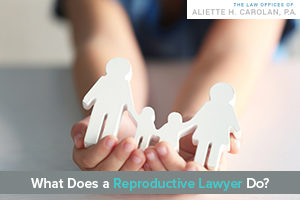When you think about welcoming a new baby into your family, the law is probably the furthest thing from your mind. However, advances in medical science and reproductive technologies have changed the way some people have children, and these new opportunities often raise legal issues.

The field of law that addresses these issues is known as “reproductive law”. A reproductive lawyer helps to negotiate the details and draft or review contracts to ensure that the process goes as smoothly as possible and your goals are fulfilled.
Surrogate Motherhood
Surrogacy offers a solution for women who are unable to carry their own children to term. A pregnancy surrogate will be carrying your child for nine months, which requires agreement on a great many specifics, such as medical care and fitness. Establishment of parental rights in surrogacy situations may be complicated, and the process differs from state to state. Depending on the type of surrogacy involved, adoption may also be a necessary part of the process.
It is important that all parties to a surrogacy arrangement have a clear understanding of their rights and obligations, and are fully prepared for issues and questions that may arise during the pregnancy. Ideally, the intended parents and the surrogate will each be represented by a reproductive lawyer who can guide them through the process and ensure that their rights are protected.
Gestational Surrogacy
In gestational surrogacy, the intended parents provide the embryo, meaning that the surrogate has no biological relationship to the child. However, in most cases, the biological parents cannot be declared the legal parents of the child pre-birth. This requires negotiation and contracting with regard to many important issues, including the right to make medical decisions for the child during the pregnancy.
Reproductive law differs from state to state within the United States. In Florida, some intended parents may be declared the legal parents of the child after birth, but in other cases legal adoption is required. Biological parentage and the marital status of the intended parents both play a role in determining the process required to establish parentage.
Traditional Surrogacy
In a traditional surrogacy case, the surrogate is the biological mother of the child. Thus, the intended mother will have to adopt the child to establish legal parentage. A reproductive attorney can both prepare surrogacy agreements and handle the adoption process.
Donation of Eggs, Sperm or Embryos
Egg donation and sperm donation are more common than surrogacy or embryo donation in the United States. These procedures are well-established, but still involve potentially complicated legal issues. For example, a donor agreement should address not only parentage and issues such as contact with the child, but also many other things that parents might not consider, such as disposition of unused embryos.
A Reproductive Lawyer Can Help Protect Your Rights
Whether you are considering adding to your family through surrogacy or donation, or you wish to help an infertile couple have a child, understanding your legal rights and creating strong, clear agreements in advance is critical. The Law Offices of Aliette H. Carolan, P.A. can help. Make scheduling a consultation your next step. Just call (305) 358-2330.
